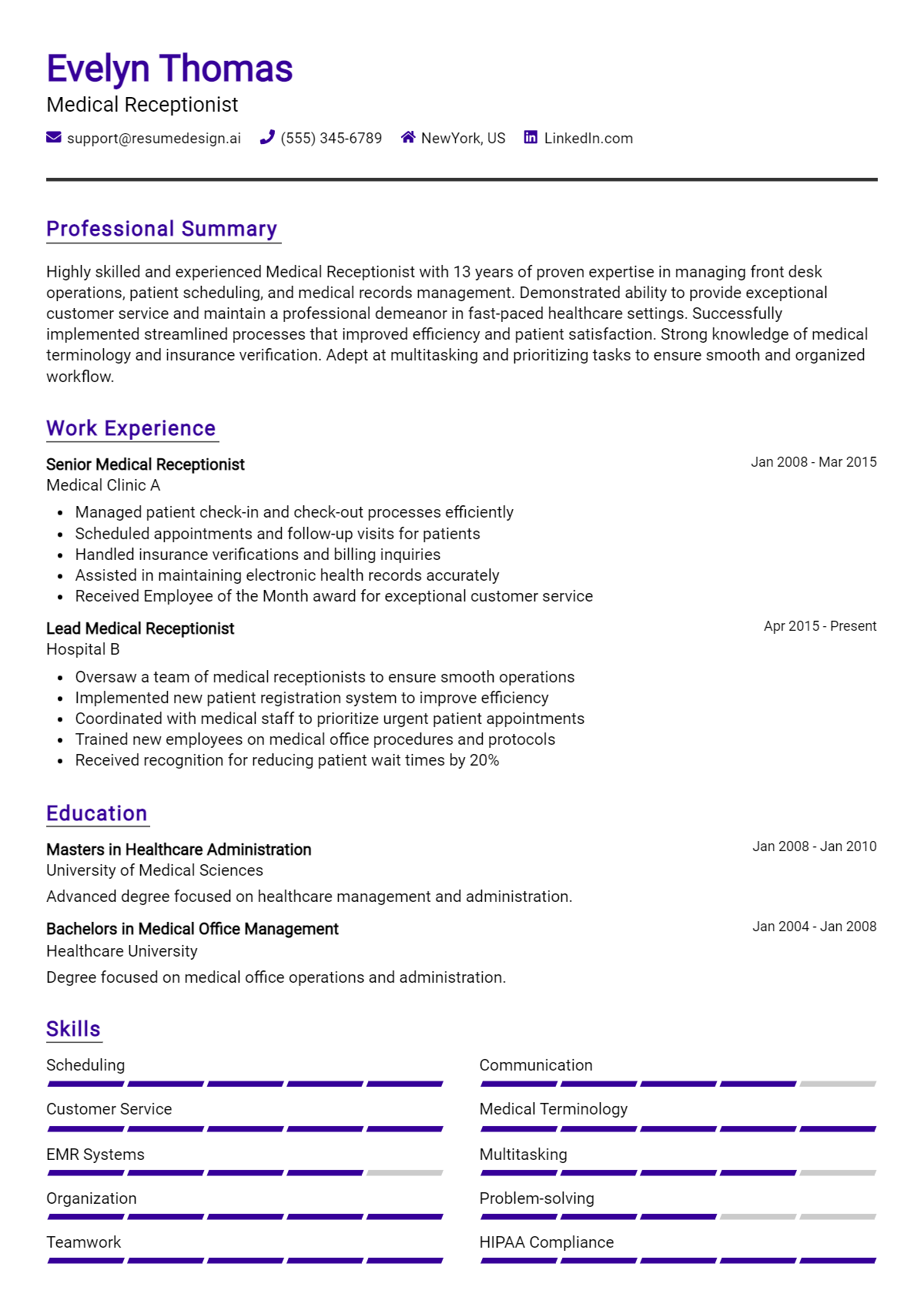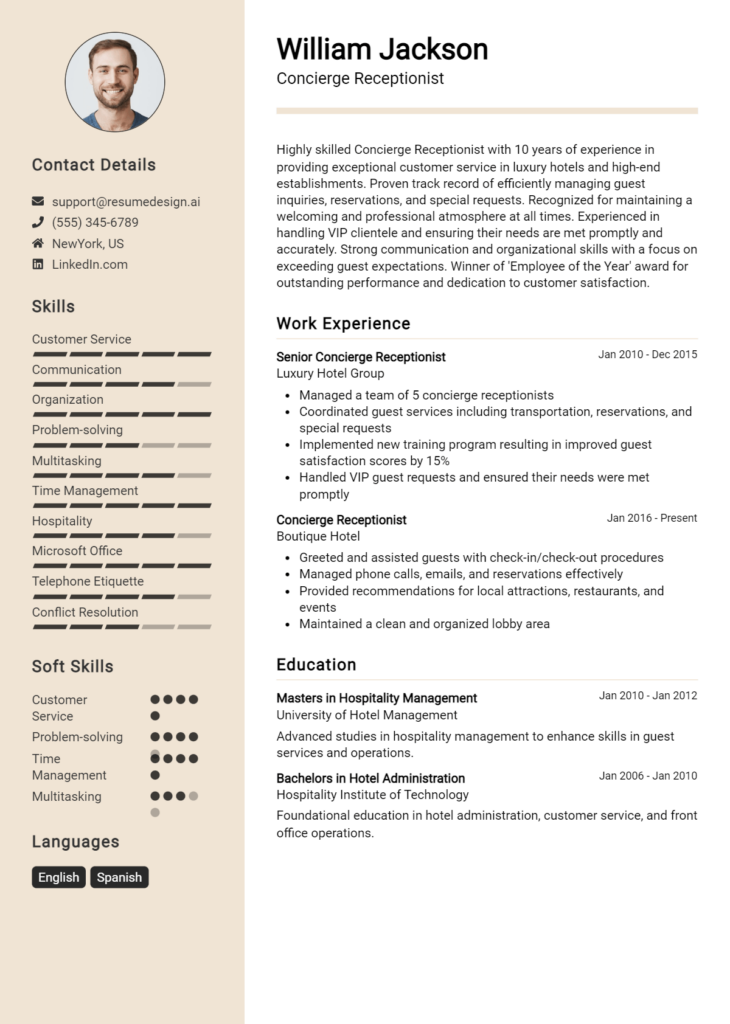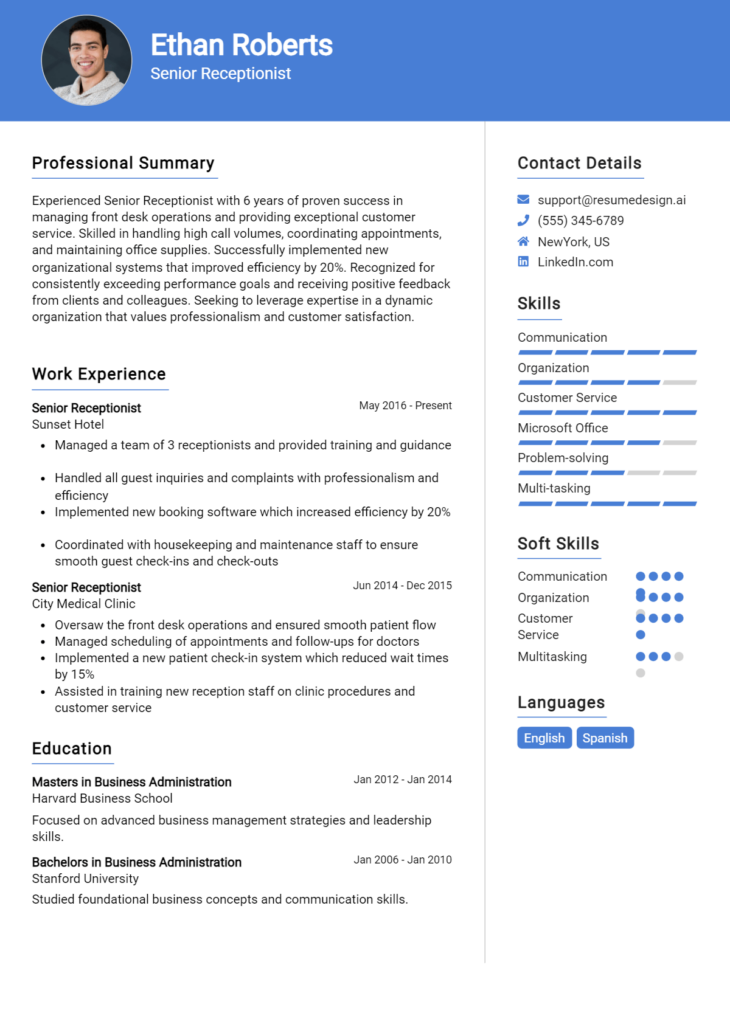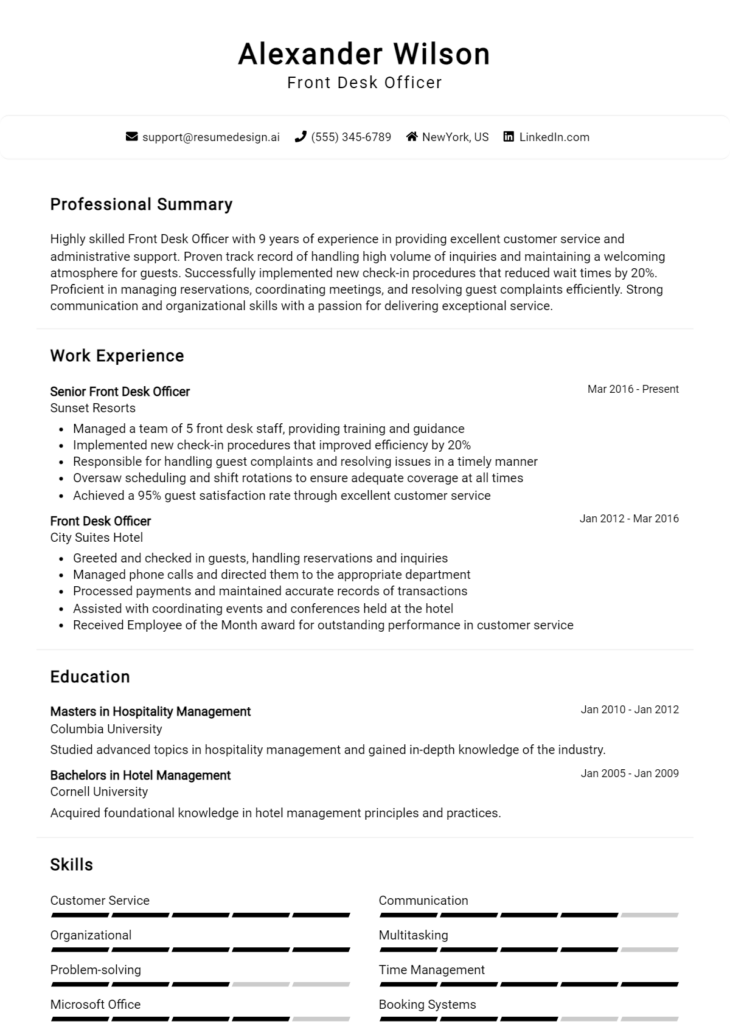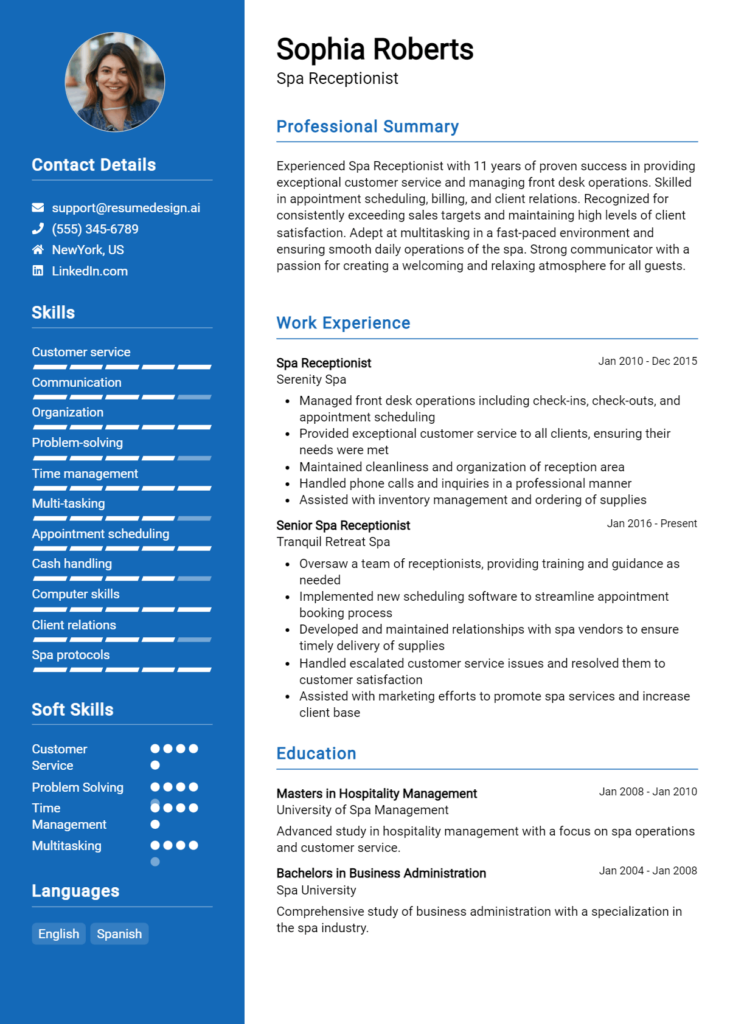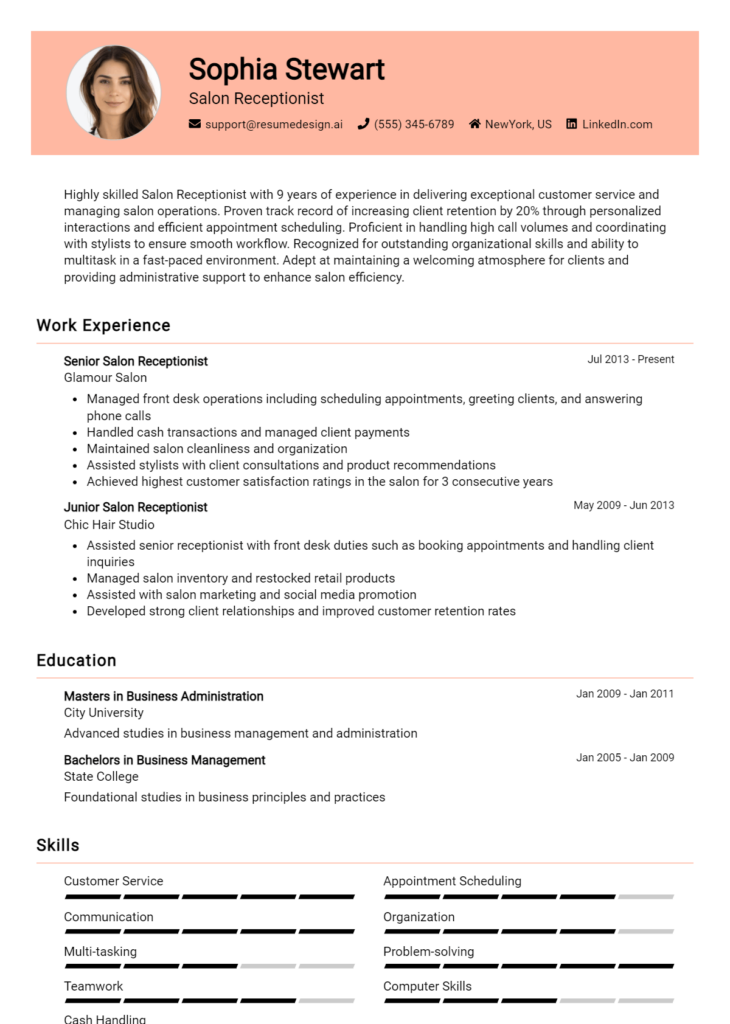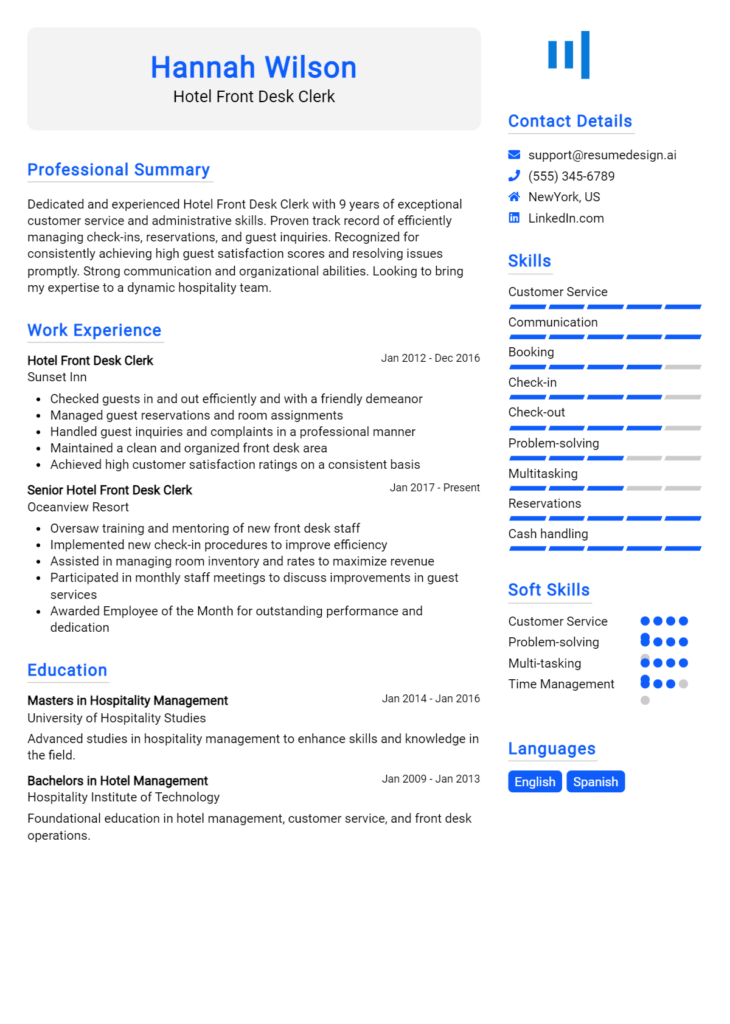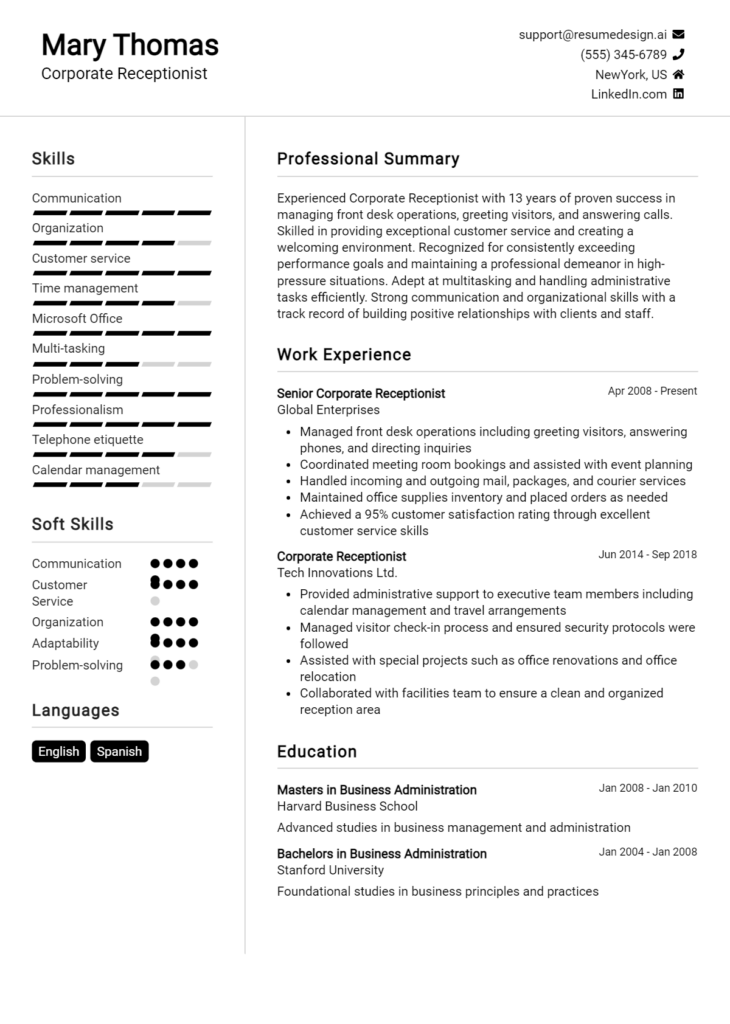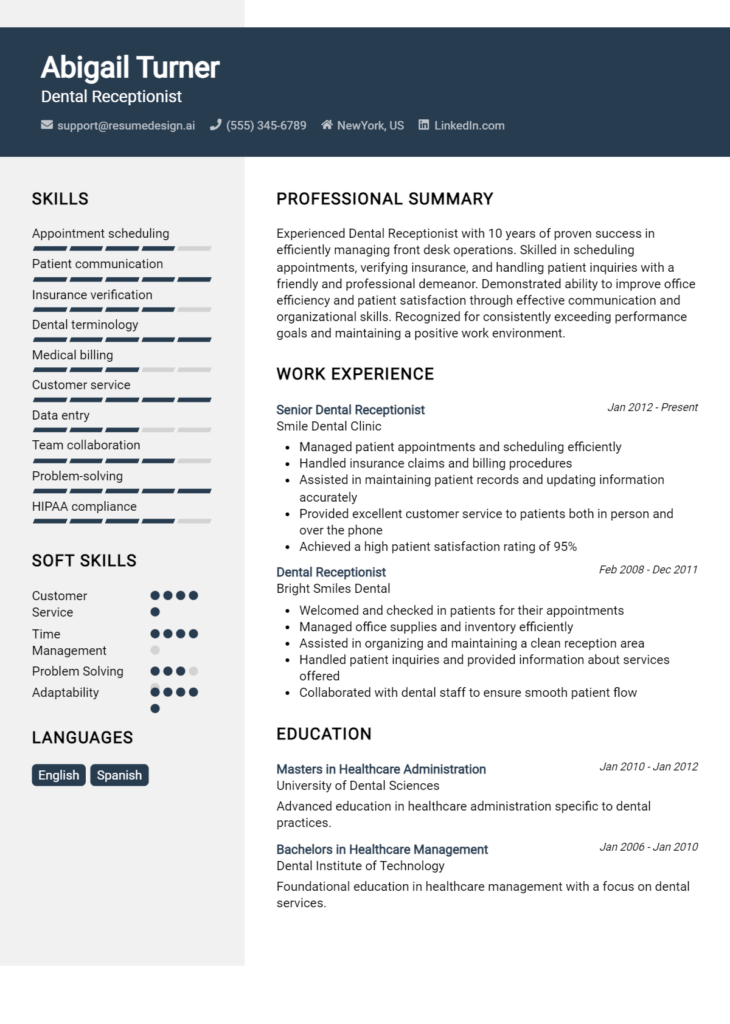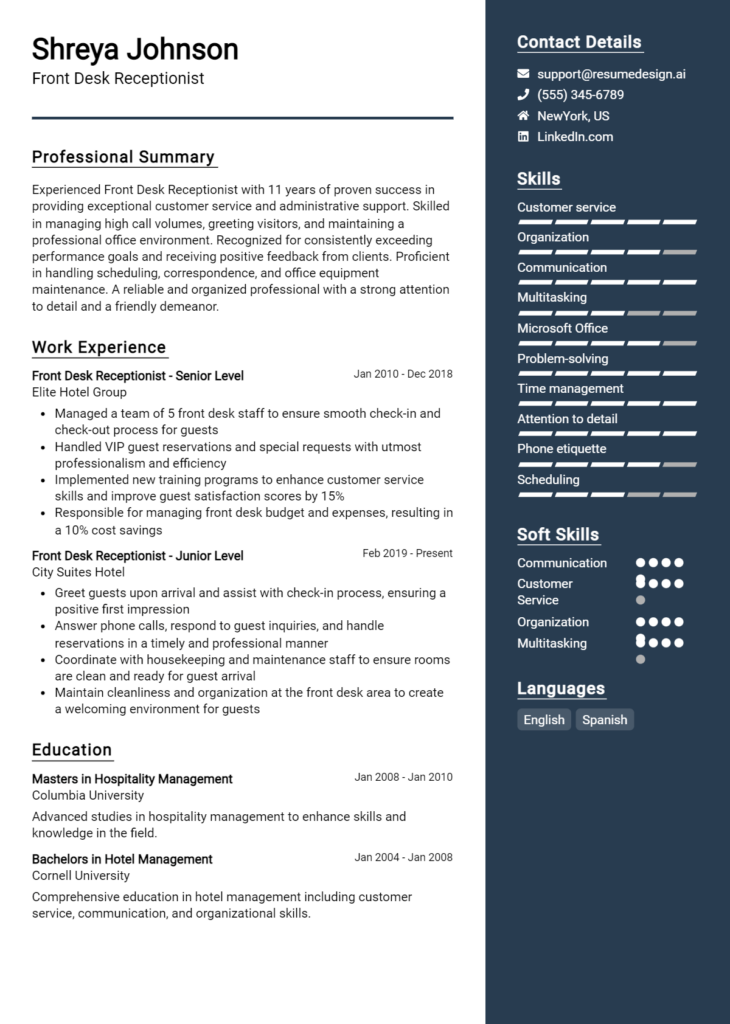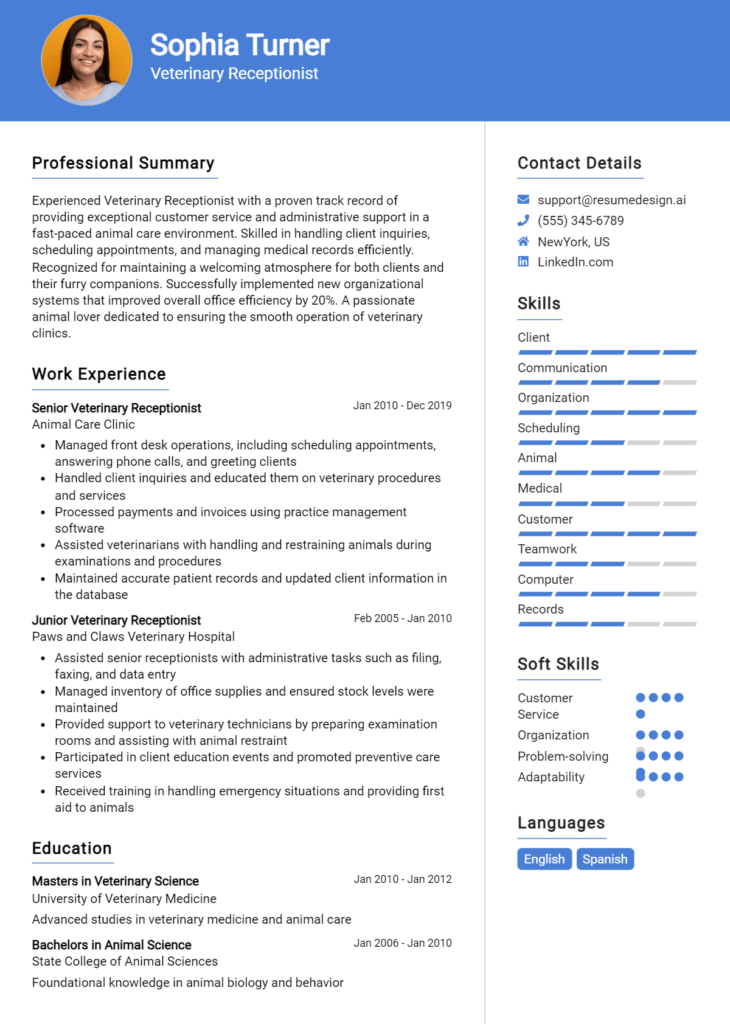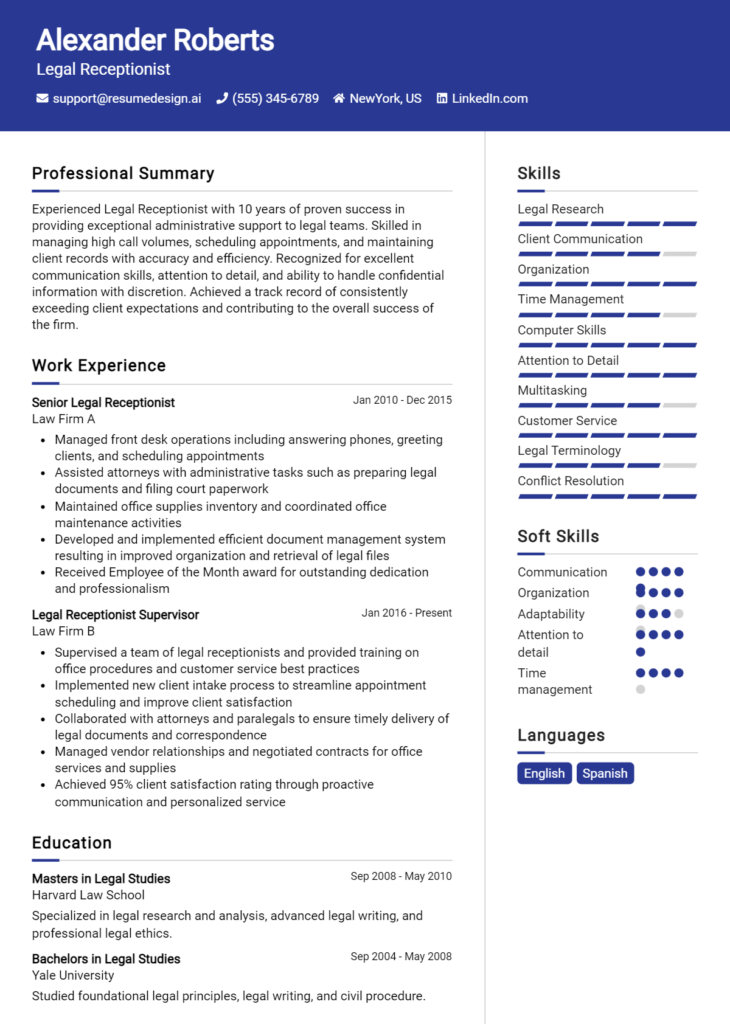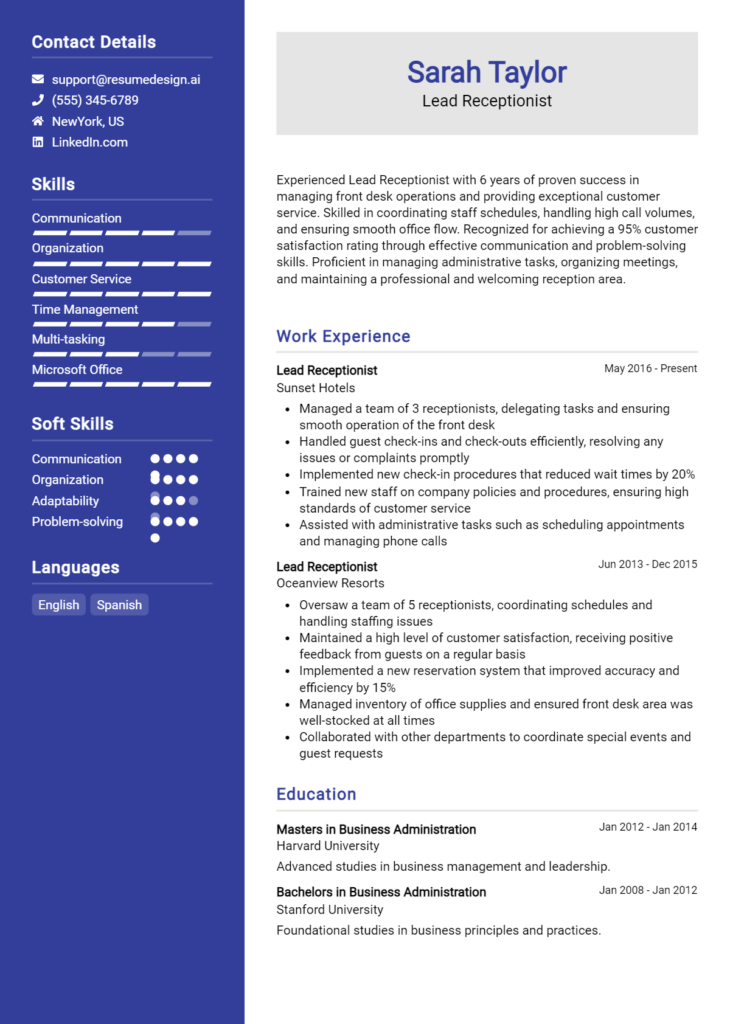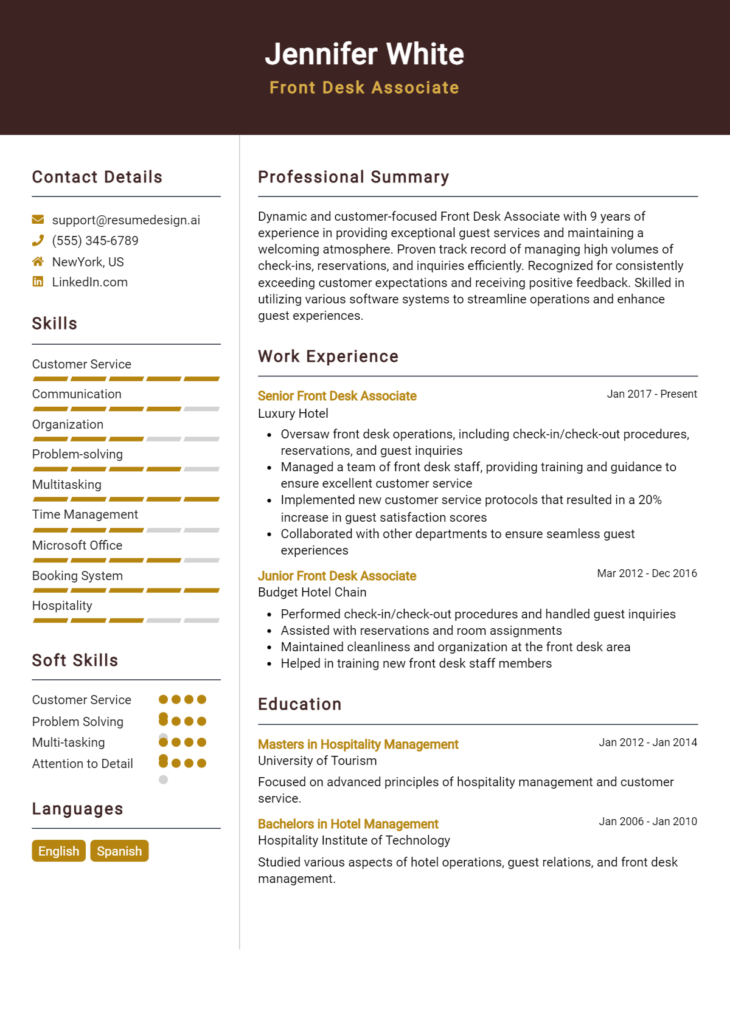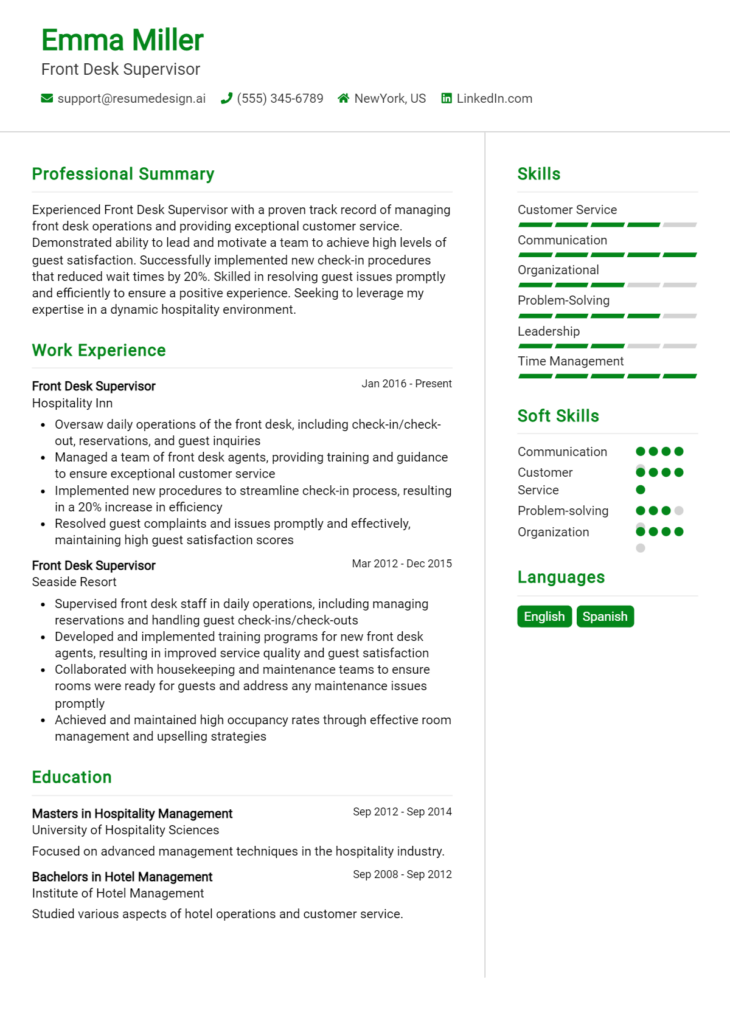Medical Receptionist Core Responsibilities
A Medical Receptionist plays a vital role in healthcare settings, acting as the first point of contact for patients while facilitating communication between various departments. Key responsibilities include managing patient appointments, maintaining medical records, and ensuring efficient office operations. Essential skills encompass technical proficiency with healthcare software, strong organizational capabilities, and adept problem-solving. These competencies contribute significantly to the organization's goals by enhancing patient satisfaction and operational efficiency. A well-structured resume can effectively highlight these qualifications, showcasing a candidate’s readiness for this dynamic role.
Common Responsibilities Listed on Medical Receptionist Resume
- Greeting and assisting patients upon arrival
- Scheduling and coordinating patient appointments
- Managing patient records and ensuring confidentiality
- Answering phone calls and responding to inquiries
- Processing patient insurance information
- Collecting payments and managing billing inquiries
- Coordinating with healthcare providers and departments
- Maintaining a clean and organized reception area
- Preparing and sending patient correspondence
- Assisting with administrative tasks as needed
- Managing medical supplies and inventory
- Providing support during patient check-in and check-out processes
High-Level Resume Tips for Medical Receptionist Professionals
In the competitive field of healthcare, a well-crafted resume is essential for Medical Receptionist professionals looking to make a strong first impression on potential employers. Your resume serves as your personal marketing tool, showcasing not only your skills and experience but also your ability to contribute positively to a medical office environment. It is crucial for your resume to reflect your achievements and expertise, as it is often the first point of contact between you and your future employer. This guide will provide practical and actionable resume tips specifically tailored for Medical Receptionist professionals, ensuring you stand out in the application process.
Top Resume Tips for Medical Receptionist Professionals
- Tailor your resume to match the job description by using relevant keywords that reflect the skills and qualifications the employer is seeking.
- Highlight your experience in medical settings, including any roles in administrative support, patient interaction, and office management.
- Quantify your achievements, such as the number of patients scheduled per day or improvements in office efficiency, to demonstrate your impact.
- Include industry-specific skills, such as knowledge of medical terminology, electronic health record (EHR) systems, and insurance processing.
- Showcase your communication skills, both verbal and written, as effective communication is crucial in a medical receptionist role.
- Emphasize your organizational skills by mentioning your ability to prioritize tasks and manage multiple responsibilities in a fast-paced environment.
- List relevant certifications or training courses, such as CPR certification or courses in medical office administration, to enhance your credibility.
- Keep your resume concise and focused; ideally, limit it to one page while ensuring all critical information is presented clearly.
- Utilize a clean and professional layout that makes it easy for hiring managers to read and navigate your resume.
By implementing these tips, you can significantly increase your chances of landing a job in the Medical Receptionist field. A well-organized and tailored resume not only highlights your qualifications but also reflects your professionalism and attention to detail, both of which are essential traits in the healthcare environment.
Why Resume Headlines & Titles are Important for Medical Receptionist
In the competitive field of healthcare, the role of a Medical Receptionist is crucial as they serve as the first point of contact for patients and play a significant role in the overall patient experience. A well-crafted resume headline or title is essential for highlighting a candidate's qualifications and capturing the attention of hiring managers. A strong headline can succinctly summarize relevant skills, experience, and achievements, offering a powerful first impression that encourages further review of the resume. It should be concise, relevant, and directly aligned with the responsibilities and requirements of the Medical Receptionist position, making it a vital component of an effective job application.
Best Practices for Crafting Resume Headlines for Medical Receptionist
- Keep it concise: Aim for one impactful phrase that encapsulates your qualifications.
- Be role-specific: Tailor your headline to reflect the specific Medical Receptionist position you are applying for.
- Highlight key skills: Include essential skills that are relevant to the role, such as communication or organizational skills.
- Showcase experience: If applicable, mention years of experience or specific achievements that demonstrate your expertise.
- Use action-oriented language: Start with strong action verbs to create a sense of proactivity.
- Avoid jargon: Use clear and straightforward language that is easy to understand.
- Incorporate keywords: Utilize keywords from the job description to align your headline with the employer’s needs.
- Make it unique: Differentiate yourself from other candidates by highlighting what makes you stand out.
Example Resume Headlines for Medical Receptionist
Strong Resume Headlines
Compassionate Medical Receptionist with 5 Years of Experience in Patient Care and Administrative Support
Detail-Oriented Medical Receptionist Skilled in Multitasking and Efficient Appointment Scheduling
Dedicated Medical Receptionist with Proven Track Record of Enhancing Patient Satisfaction and Streamlining Office Operations
Weak Resume Headlines
Just Another Medical Receptionist
Medical Receptionist Seeking Job
Strong resume headlines are effective because they immediately communicate the candidate’s relevant experience, skills, and commitment to the role, making them memorable to hiring managers. In contrast, weak headlines fail to impress due to their vagueness and lack of specificity, leaving hiring managers with little reason to consider the candidate further. By avoiding generic phrases and instead focusing on impactful, targeted statements, candidates can significantly enhance their chances of standing out in the job market.
Writing an Exceptional Medical Receptionist Resume Summary
A resume summary is a critical component for a Medical Receptionist's application, as it serves as the first impression for hiring managers. A well-crafted summary quickly captures attention by highlighting key skills, relevant experience, and notable accomplishments tailored to the medical field. This concise and impactful statement not only sets the tone for the rest of the resume but also emphasizes the candidate's suitability for the position, making it essential to ensure that it aligns with the specific job description being targeted.
Best Practices for Writing a Medical Receptionist Resume Summary
- Quantify achievements to demonstrate impact, such as the number of patients managed or appointments scheduled.
- Focus on relevant skills, such as proficiency in medical software, patient communication, and scheduling.
- Tailor the summary to match the job description, using keywords and phrases that resonate with the employer's needs.
- Keep it concise, ideally between 2-4 sentences, to maintain readability and engagement.
- Highlight specific accomplishments that illustrate your contributions in previous roles.
- Use action verbs to convey a sense of proactivity and effectiveness.
- Showcase soft skills, such as empathy and teamwork, which are essential in a medical environment.
- Avoid jargon or overly complex language to ensure clarity and accessibility.
Example Medical Receptionist Resume Summaries
Strong Resume Summaries
Dedicated Medical Receptionist with over 5 years of experience in managing high-volume patient schedules and improving office efficiency, resulting in a 20% reduction in appointment wait times.
Detail-oriented professional skilled in electronic health record management and patient billing, achieving a 98% accuracy rate in data entry and processing.
Compassionate Medical Receptionist with a proven track record of enhancing patient satisfaction scores by 30% through effective communication and personalized service.
Multilingual Medical Receptionist with expertise in coordinating patient care for diverse populations, successfully assisting over 1,500 patients annually in a fast-paced clinic.
Weak Resume Summaries
I am a Medical Receptionist looking for a job where I can use my skills.
Experienced in the medical field and good with people. I want to work in a healthcare setting.
The strong resume summaries are effective because they are specific, quantifiable, and directly relevant to the role of a Medical Receptionist. They highlight measurable achievements, relevant skills, and demonstrate the candidate's ability to contribute positively to the workplace. On the other hand, the weak summaries lack detail and specificity, making them appear generic and unremarkable, which does not effectively capture the hiring manager's interest.
Work Experience Section for Medical Receptionist Resume
The work experience section in a Medical Receptionist resume is crucial as it provides a comprehensive overview of the candidate's technical skills, team management capabilities, and ability to deliver high-quality patient care. This section not only highlights relevant experiences but also allows candidates to quantify their achievements, showcasing their contributions to previous employers. By aligning their experiences with industry standards, candidates can demonstrate their proficiency in essential tasks such as scheduling appointments, managing electronic health records, and ensuring efficient office operations, making them stand out in a competitive job market.
Best Practices for Medical Receptionist Work Experience
- Use clear and concise language to describe your responsibilities and achievements.
- Quantify results where possible (e.g., “Managed a patient load of 50+ daily”).
- Highlight technical skills relevant to the role, such as proficiency in medical software.
- Include examples of collaboration with healthcare teams to improve patient care.
- Focus on achievements that demonstrate leadership or initiative.
- Tailor your experience to include industry-specific terms and standards.
- List any certifications or training that enhance your qualifications.
- Keep the format professional and easy to read for hiring managers.
Example Work Experiences for Medical Receptionist
Strong Experiences
- Successfully streamlined patient check-in processes, reducing wait times by 30% and improving patient satisfaction scores.
- Implemented a new electronic health record system that increased data accuracy by 25%, enhancing overall office efficiency.
- Led a team of 5 receptionists, coordinating schedules and ensuring coverage during peak hours, resulting in a 15% improvement in office workflow.
- Collaborated with medical staff to develop patient education materials that decreased appointment cancellations by 20%.
Weak Experiences
- Handled phone calls and scheduled appointments.
- Assisted patients with paperwork and other tasks.
- Worked in a busy medical office.
- Helped with various administrative tasks as needed.
The examples provided illustrate the difference between strong and weak experiences in a Medical Receptionist resume. Strong experiences are characterized by specific, quantifiable results and demonstrate the candidate's technical expertise and leadership abilities. In contrast, weak experiences lack detail and fail to convey the candidate's impact or contributions to the workplace, making them less compelling to potential employers.
Education and Certifications Section for Medical Receptionist Resume
The education and certifications section of a Medical Receptionist resume plays a crucial role in showcasing a candidate's academic background and industry-relevant credentials. This section not only highlights formal education but also emphasizes any certifications and specialized training that demonstrate a commitment to continuous learning and professional development. By including relevant coursework and recognized qualifications, candidates can significantly enhance their credibility and present themselves as well-aligned with the requirements of the job role, making a strong case for their capabilities in providing administrative support in a medical setting.
Best Practices for Medical Receptionist Education and Certifications
- Include only relevant degrees or certifications that pertain to the medical or administrative field.
- Provide specific details about certifications, such as the issuing organization and the date obtained.
- Highlight advanced or specialized certifications that demonstrate additional expertise, such as Certified Medical Administrative Assistant (CMAA).
- List any relevant coursework that pertains to medical terminology, healthcare administration, or patient management.
- Use concise language and bullet points for clarity and easy scanning by hiring managers.
- Update the section regularly to include new qualifications or training you have completed.
- Consider including a brief explanation of any certifications that may not be commonly known.
- Prioritize the most relevant qualifications at the top of the list to catch the reader's attention.
Example Education and Certifications for Medical Receptionist
Strong Examples
- Associate Degree in Health Administration from XYZ Community College, 2022
- Certified Medical Administrative Assistant (CMAA) from the National Healthcareer Association, 2023
- Coursework in Medical Terminology and Healthcare Law, ABC Online University, 2021
- CPR and First Aid Certification, American Red Cross, 2023
Weak Examples
- Bachelor's Degree in History from XYZ University, 2020
- Certification in General Office Procedures from a local community center, 2010
- High School Diploma, 2015
- Obsolete certification in Medical Billing from a defunct organization, 2018
The strong examples are considered effective because they directly relate to the medical receptionist role, showcasing relevant degrees and certifications that enhance the candidate's qualifications. These examples demonstrate a clear focus on education and training pertinent to the healthcare field. Conversely, the weak examples are less effective as they either lack relevance to the role of a medical receptionist or represent outdated or irrelevant qualifications that do not contribute to the candidate's credibility in the medical administrative domain.
Top Skills & Keywords for Medical Receptionist Resume
In the fast-paced and often demanding environment of healthcare, the role of a Medical Receptionist is pivotal. This position serves as the first point of contact for patients and plays a crucial part in ensuring that the administrative aspects of a medical facility run smoothly. A well-crafted resume for a Medical Receptionist should effectively highlight both hard and soft skills, as these attributes demonstrate not only the technical capabilities required for the job but also the interpersonal qualities that enhance patient experience. By showcasing the right skills on a resume, candidates can significantly increase their chances of standing out to potential employers in a competitive job market.
Top Hard & Soft Skills for Medical Receptionist
Soft Skills
- Excellent Communication
- Empathy and Compassion
- Time Management
- Problem-Solving
- Attention to Detail
- Multitasking Ability
- Customer Service Orientation
- Adaptability
- Teamwork and Collaboration
- Professionalism
- Conflict Resolution
- Active Listening
- Positive Attitude
- Interpersonal Skills
- Organization Skills
Hard Skills
- Proficient in Electronic Health Records (EHR) Systems
- Medical Terminology Knowledge
- Appointment Scheduling Software
- Insurance Verification and Billing
- Data Entry and Management
- Medical Coding Basics
- Patient Privacy Regulations (HIPAA Compliance)
- Microsoft Office Suite (Word, Excel, Outlook)
- Basic Clinical Knowledge
- Phone Systems Proficiency
- Filing and Record Keeping
- Understanding of Medical Procedures
- Typing Speed and Accuracy
- Knowledge of Lab Processes
- Inventory Management
- Understanding of Patient Registration Processes
- Work Experience in a Healthcare Setting
- Familiarity with Office Equipment (e.g., Fax Machines, Copiers)
By emphasizing a blend of these skills on a resume, aspiring Medical Receptionists can effectively convey their readiness to contribute to a healthcare team and provide exceptional support to patients and staff alike.
Stand Out with a Winning Medical Receptionist Cover Letter
Dear [Hiring Manager's Name],
I am writing to express my interest in the Medical Receptionist position at [Company Name] as advertised on [where you found the job posting]. With a strong background in healthcare administration and a passion for providing exceptional patient care, I am excited about the opportunity to contribute to your team. My experience in managing front desk operations and a keen ability to maintain a welcoming environment for patients make me a perfect fit for this role.
In my previous position at [Previous Employer], I was responsible for a wide range of tasks, including scheduling appointments, handling patient inquiries, and managing medical records. I developed a system that streamlined appointment scheduling, reducing wait times by 20% and improving patient satisfaction. My ability to communicate effectively with both patients and medical staff has allowed me to build strong relationships and ensure a smooth flow of information within the practice. Additionally, my proficiency in various electronic health record (EHR) systems has equipped me to handle patient data with accuracy and confidentiality.
I am particularly drawn to the mission of [Company Name] in providing high-quality healthcare services. I believe that my empathetic approach and attention to detail align with your values. I am eager to leverage my skills in a dynamic environment where I can contribute to creating a positive patient experience. I am confident that my proactive attitude and commitment to excellence will make a significant impact at your practice.
Thank you for considering my application. I look forward to the opportunity to discuss how my experience and skills can benefit [Company Name]. I am excited about the possibility of contributing to your team and helping to enhance the patient experience at your facility.
Sincerely,
[Your Name]
[Your Phone Number]
[Your Email Address]
Common Mistakes to Avoid in a Medical Receptionist Resume
When crafting a resume for a Medical Receptionist position, it's essential to present a professional and polished image. Many candidates unknowingly make common mistakes that can hinder their chances of landing an interview. By avoiding these pitfalls, you can ensure that your resume stands out and accurately reflects your qualifications and skills for this vital role in a healthcare setting.
Overly Lengthy Resumes: Including unnecessary details can make your resume too long. Aim for a concise one-page format that highlights your most relevant experience.
Generic Objective Statements: Using a vague objective statement fails to capture the employer's attention. Customize your objective to reflect your specific interest in the medical receptionist role and the organization.
Ignoring Keywords: Many employers use Applicant Tracking Systems (ATS) to filter resumes. Not incorporating relevant keywords from the job description may cause your resume to be overlooked.
Lack of Quantifiable Achievements: Failing to include specific accomplishments can weaken your resume. Use metrics to showcase your impact, such as "managed patient scheduling for a clinic serving over 500 patients weekly."
Inconsistent Formatting: A resume with inconsistent formatting can appear unprofessional. Use uniform fonts, sizes, and spacing to create a clean and organized layout.
Typos and Grammatical Errors: Mistakes in spelling or grammar can create a negative impression. Always proofread your resume multiple times or have someone else review it.
Neglecting Relevant Skills: Not highlighting key skills specific to the medical receptionist role, such as communication, multitasking, and familiarity with electronic health records (EHR), can diminish your appeal.
Omitting Professional Development: Failing to mention relevant certifications or training programs can be a missed opportunity. Include any courses or certifications that enhance your qualifications, such as CPR training or medical office administration courses.
Conclusion
As a Medical Receptionist, you play a crucial role in ensuring the smooth operation of healthcare facilities. Your responsibilities include managing patient interactions, scheduling appointments, maintaining medical records, and coordinating communication between patients and healthcare providers. To stand out in this competitive field, it’s essential to have a well-crafted resume that highlights your skills, experience, and dedication to patient care.
In this article, we covered the vital skills and qualifications needed for a Medical Receptionist role, including strong organizational abilities, excellent communication skills, and familiarity with medical terminology and office software. We also discussed the importance of showcasing relevant experience and any specialized training you may have received.
Now that you have a better understanding of what makes a great Medical Receptionist resume, it’s time to take action. Review your current resume and ensure it effectively reflects your skills and experiences. To assist you in this process, consider utilizing helpful resources such as resume templates, a user-friendly resume builder, and resume examples that can inspire your writing. Don’t forget to also create a compelling cover letter using our cover letter templates to enhance your job application.
Take the next step in your career as a Medical Receptionist by refining your resume today!

